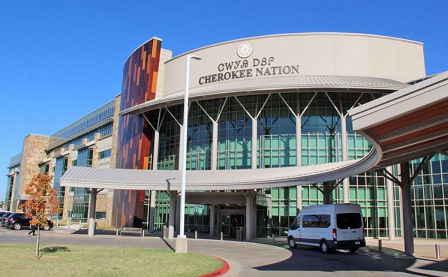
- Details
- By Chuck Hoskin Jr
Like many tribes across the United States, Cherokee Nation operates a Tribal Employment Rights Office (TERO) program to prioritize contracting with businesses that are owned by and employ Native Americans. I am proud to celebrate the 40th year of our TERO program, which stands tall as one of the most respected throughout Indian Country. It is a stellar example of tribal self-determination and economic empowerment.
We recently celebrated our vendors at an annual celebratory banquet. We honored eight standout TERO businesses with awards, including winners from Tulsa, Spavinaw, Muskogee, Westville, Sallisaw, Pryor and Stilwell.
Today, the tribe’s TERO office has certified 733 Indian-owned companies and 180 artists who can do business with the tribe and compete for government contracting jobs. During the 2023 fiscal year, TERO vendors earned over $250 million in contracts from our sovereign government. Their services have been crucial as we undertake the largest construction and capital improvement boom in the history of the Cherokee Nation.
 Make A Donation Here
Make A Donation Here
Cherokee Nation investments and the work of TERO contractors are visible across our reservation in community centers, health clinics, early childhood development centers, wellness trails, better roads and new homes for Cherokees. The Cherokee building boom is making huge strides for our communities and families across northeast Oklahoma. At the same time, the diligent efforts of our TERO program are putting more Cherokees to work in good paying jobs.
The TERO program also certifies Native American artists and creates opportunities for them to sell their art. With so much beautiful and meaningful Cherokee artwork throughout tribal facilities, many could double as free museums. TERO and initiatives like the Artist Recovery Act ensure that our valued artisans can support themselves in creative careers. Besides supporting artists, that keeps our culture strong.

We have also introduced a new website — cherokeebids.org — making it easier than ever for TERO-certified individuals and businesses to bid on Cherokee Nation projects.
Cherokee-owned small businesses are the lifeblood of our local communities. Across the country, small businesses are responsible for 75% of new jobs created, and within our 14-county reservation, Indian-owned businesses are lifting up the state’s economy.
This growth is beneficial for Cherokees and for all Oklahomans. Every day, Cherokee Nation is improving health care, building opportunities for families and creating good jobs. Through it all, we are nurturing Native-owned businesses, because they are building a brighter future for local communities.
Chuck Hoskin, Jr. is the principal chief of the Cherokee Nation.
More Stories Like This
Colorado cannot heal until it confronts Sand Creek honestlyNative American Mothers Deserve to Live
Technology Rooted in Tradition is Strengthening Cherokee Nation
The Lumbee Tribe of North Carolina: #575
Tribes Do Not Need a Greenlight to Build Renewable Energy
Help us defend tribal sovereignty.
At Native News Online, our mission is rooted in telling the stories that strengthen sovereignty and uplift Indigenous voices — not just at year’s end, but every single day.
Because of your generosity last year, we were able to keep our reporters on the ground in tribal communities, at national gatherings and in the halls of Congress — covering the issues that matter most to Indian Country: sovereignty, culture, education, health and economic opportunity.
That support sustained us through a tough year in 2025. Now, as we look to the year ahead, we need your help right now to ensure warrior journalism remains strong — reporting that defends tribal sovereignty, amplifies Native truth, and holds power accountable.
 The stakes couldn't be higher. Your support keeps Native voices heard, Native stories told and Native sovereignty defended.
The stakes couldn't be higher. Your support keeps Native voices heard, Native stories told and Native sovereignty defended.
Stand with Warrior Journalism today.
Levi Rickert (Potawatomi), Editor & Publisher
